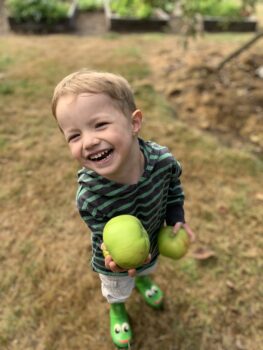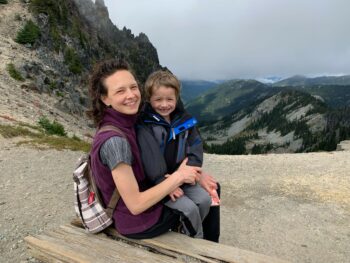Getting to the Heart of Uncompensated Care
12.5.2023 | Issabelle Minasian
 Rachael and her husband had saved for years to buy their first home, where they hoped to settle and raise their family. With a two-year-old boy and a baby on the way, they excitedly made an offer on a house in Bellingham and scheduled an appointment to sign the last of the papers.
Rachael and her husband had saved for years to buy their first home, where they hoped to settle and raise their family. With a two-year-old boy and a baby on the way, they excitedly made an offer on a house in Bellingham and scheduled an appointment to sign the last of the papers.
While they awaited their closing date, Rachael, who was pregnant with baby Auren, had a scan that revealed a potential heart problem. Providers at their local clinic thought it could be a condition that might resolve itself, but referred them to Seattle Children’s Hospital for further tests. Those tests confirmed a diagnosis of hypoplastic left heart syndrome (HLHS), which meant that half of Auren’s heart was not developing. He would require specialized care and at least three major surgeries after he was born – possibly more.
It was the type of news no parents ever want to hear. “We didn’t know what he would need, because the level of support these kids require is such a wide range,” recalls Rachael. “We had no idea how long he would be in the hospital. We heard everything from three weeks, to a whole year. It was really difficult to prepare.”
As fate would have it, the day they received Auren’s diagnosis was the same day Rachael and her husband had planned to sign the final papers for their house. With so many looming questions about their future, they were hesitant, but the home was already under contract.
“Obviously, this was very stressful and it was such a relief when we found out about the uncompensated care program at Seattle Children’s,” Rachael remembers. “We’ve been fortunate in that we generally have food stability, and we haven’t had serious issues with housing, but you can’t plan financially for a diagnosis like this.”
Kenia Ramirez-Hernandez, a social worker at Seattle Children’s, echoes the importance of financial aid for families at the hospital. “Uncompensated care provides multiple layers of support that are crucial to the overall well-being of patients and their families during some of the most challenging times of their lives.”
Rachael applied right away for financial aid, and there were no further complications with her pregnancy. They were able to live in their new home for three months, but as her due date approached, they relocated to stay with family members who lived closer to Seattle Children’s.
Auren was born at 39 weeks, with additional providers on-hand as a precautionary measure, but the delivery went smoothly. “None of the 20 people that were in the delivery room had anything to do,” Rachael remembers with a laugh. Auren was transferred to Seattle Children’s shortly after his birth and underwent his first surgery.
“They always tell you these surgeries are performed often, but they’re very high risk with an infant, and we don’t know what’s going to happen. I just remember holding him in the morning before surgery, thinking it could be the last time. It never gets easier. We’ve done it three times now, and it doesn’t get easier,” says Rachael.
Auren had his second surgery at 5-and-a-half months, and unfortunately during that time Rachael’s husband lost his job. With her husband looking for work and Auren’s need to be near Seattle Children’s for care, the family sold their house in Bellingham and moved south – first to live with family and later to a new house just an hour from the hospital.
 Auren has now had what he calls three “big surgeries,” and loves to play sports and run around with his big brother and younger sister. He continues to receive care from Seattle Children’s cardiology team, and this summer the whole family was able to go on their first family road trip.
Auren has now had what he calls three “big surgeries,” and loves to play sports and run around with his big brother and younger sister. He continues to receive care from Seattle Children’s cardiology team, and this summer the whole family was able to go on their first family road trip.
“We are so thankful for the people who so generously give money to Seattle Children’s and help families like ours through these really hard times,” says Rachael. “We never saw a bill, and it was just the most amazing thing. It’s never far from our minds how thankful we are to receive financial aid, because that’s one piece of the puzzle that we didn’t have to stress about.”